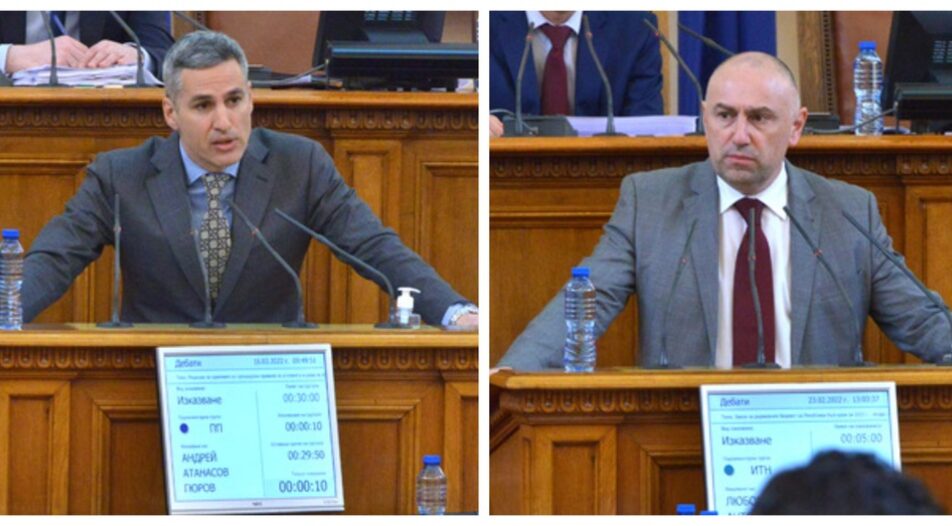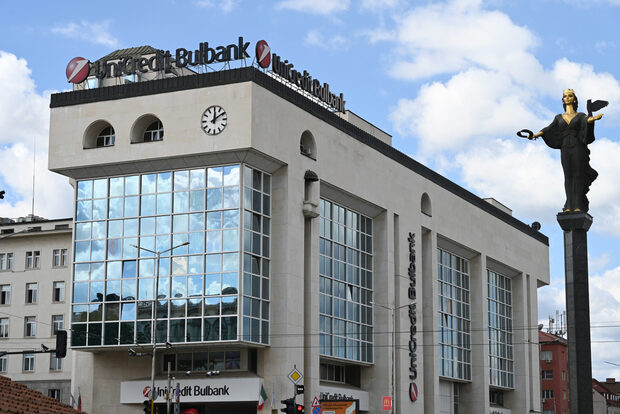By design and by law, the Bulgarian National Bank (BNB) ought to be politically and institutionally independent. The events surrounding the selection of a new governor of the bank, however, show that this is a more or less impossible task. The first, 20-day long procedure that the Parliamentary Budget committee launched, giving parties the chance to find an entirely expert candidate for governor, including one "imported" from abroad, was insufficient. And the second procedure, which gave barely a week for nominations, led only to party nominations.
The position of a governor is a key one, especially in light of Bulgaria's ambitions to adopt the euro by 2024. The two competitors for the seat of Dimitar Radev (who has been in position for over seven years - 1,5 years longer than the official term of his mandate) are the chairman of the parliamentary group of Prime Minister Kiril Petkov's We Continue the Change (WCC) party Andrei Gyurov and the chairman of the budget committee in parliament Lyubomir Karimanski, from Slavi Trifonov's There is such a people (TISP). The stakes for this competition run higher than control over the BNB itself - the clash might result in the very break-up of the coalition.
On the one hand, Mr Trifonov's party is looking for support from the opposition GERB and MRF parties (and according to some sources, such support has already been promised), and even so it may not be enough and Mr Karimanski may need the votes of the radical Vazrazhdane party. On the other hand, without full support from the coalition partners, the WCC nominee can hardly be pushed through without playing with the quorum in Parliament or getting at least some opposition MPs on board. In either case, it will be difficult for any of the candidates to gain the broad support that would give the new governor, and his vision on how to run the institution whose prerogatives are monetary policy and banking supervision in the country, the necessary legitimacy. It also means that the new governor, despite his legally guaranteed six-year term, will be much more vulnerable to attack in the future.
Politicians vs. Experts
Both nominees have had some experience in the financial sector in the past, without, however, being able to boast an unquestionable CV and reputation as top bankers or experts in the field of central banking.
Andrei Gyurov has banking experience abroad, but in lower-level positions. According to his official biography, after studying economics in the US, he worked for a year as a credit analyst at Harris Bank in Chicago. Then, while studying for his PhD in Vienna, he worked at the Austrian Volksbank. When he defended his PhD in 2005, he left the bank and became a senior assistant professor of finance at the University of Vienna. Since 2010, Gyurov has been a senior lecturer in finance at the American University in Bulgaria. In addition to his academic career, he has been involved in consulting, including for financial institutions and banks, mainly in the field of risk management models building.
Lyubomir Karimanski also has academic experience. He was a lecturer at the University of National and World Economy in Sofia, and at the International Banking Institute in the capital. He has held consultancy positions in various European financial institutions such as the Luxembourg Banking Branch Association (ABBL), the European Payments Council etc.
However, his presentation, which was announced by TISP leader Slavi Trifonov over his favorite medium - Facebook - elegantly omits his experience in Bulgarian banks. "You can read about Lyubomir Karimanski's professional achievements in the banks in which he has worked in the official application documents that will be made publicly available," the leader wrote.
When these documents become available, the audience ought to see in them that, until 2015 he was the CEO of Investbank, which was one of the two banks with identified capital shortages in the last two banking reviews and stress tests by the BNB and the European Central Bank (ECB) in 2016 and 2019, respectively.
Big ambition meets the face-saving nomination
The next governor of the BNB, regardless who he is, will face many challenges. The banking sector is subject to increasingly complex and specific legislation at the European level. The steps towards the adoption of the euro are also fraught with many technicalities, and getting into the details would logically be easier for a technocrat rather than for a politician. Insofar as both have an academic background in finance, this should not be an insurmountable problem.As for Mr Karimanski, one can safely assume that he has had more time to prepare, since his desire to take up this post was already tangible in the previous two parliaments. In the last Parliament, he became the chairman of the budget committee and tried to push forward the process of selecting a new governor, but was blocked by some parties on the grounds that the decision should be left for when there is a regular government. Now he has taken up the issue again, claiming that he was "strongly advised not to stand for election" the first time around.
At the same time, Mr Gyurov definitely looks more like a last-minute, knee-jerk decision. Initially, WCC portrayed the ideal governor as "someone who can weigh in his international experience" and was definitely looking for a Bulgarian with experience in financial institutions around the world. Once the leading party was put in a corner by Mr Karimanski's one-man army attempt to become a governor, it found itself forced to resort to its own bench, bringing out the best it had on it. If Mr Karimanski had been the only candidate, it would have been much harder for WCC to give a reasonable explanation why they would not support him, without blowing up the already fraught coalition relations. Whereas now they have at least sent the match into overtime.
As for Mr Gyurov himself, after confirming his nomination to the media last week, he tried to exude confidence: "We expect Bulgaria's accession into the Euro zone, we expect a real change in the direction towards better transparency and accountability of the Bulgarian financial system, so that situations we have seen in the past such as the bankruptcy of the Corporate Commercial Bank (in 2014), the (perceived abuses within the) Bulgarian Development Bank (BDB), the withdrawal of millions of BGN in rucksacks, are made impossible to repeat. At this stage, what we need is for the governor of the BNB to show expertise, integrity and a consistency in their actions, and I think I have the experience to lead the BNB through these critical times," he said, adding a reassurance that his nomination did not jeopardize the coalition's relations.
The conciliatory stance can only be seen as a facade allowing party HQs some time to find a mutually acceptable solution to the obvious self-inflicted crisis created by pitting two candidates from the ruling coalition against each other. A BNB governor elected against the will of a large part of the ruling majority - with the support of GERB and MRF (which both TISP and WCC have consistently been portraying as the root of corruption in the country) - will hardly pass for the desired partner of the Prime Minister and the Finance Minister on the rocky path towards euro adoption.
A puzzle of appointments
What follows is that the two nominees will have a hearing before the Budget Committee, where they will present their concepts for the future of the Central Bank (likely this week), as the procedure allows time for NGOs' opinions and questions from the media. Since they are both members of the committee, they will have to appear before their colleagues in a casting call.
Given the importance of the question of euro adoption, it will also be important to know who will be the candidates' nominees for their deputies. Besides outgoing governor Dimitar Radev, the terms of two of his deputies - Kalin Hristov, who heads the Issue Department, responsible for the currency board, and Nina Stoyanova of the Banking Department, responsible for the payment system, have also ran out. The two divisions have a key role in the transition towards the euro, and therefore it is possible that the candidates' nominations for their deputies might make or break their own applications.
There are unofficial signals from WCC that they would be willing to bet on a third term for Kalin Hristov, whose expertise has not been disputed by any political force. The only reservations about him are linked to his skepticism regarding how much Bulgaria will benefit from the euro adoption. At the same time, however, if Mr Karimanski is elected, he is much more likely to want to rely on entirely new faces. In his speeches over the past year he has been particularly harsh and critical of the current central bank leadership on all sorts of topics, even saying that the reason he has not worked in Bulgarian banks for the past six years is the pressure BNB had put on him.
The term of the chairperson of the other key regulator of the non-banking sector, the Financial Supervision Commission, expires in the summer, which could also turn into a bargaining chip. This could create one of the worst-case scenarios for the ruling coalition - instead of freeing what were considered "captured" regulators and giving them in the hands of experts, the parties from the ruling coalition might end up parceling these regulators into part-controlled fiefdoms, following the tried and tested method of the former authorities from GERB.
By design and by law, the Bulgarian National Bank (BNB) ought to be politically and institutionally independent. The events surrounding the selection of a new governor of the bank, however, show that this is a more or less impossible task. The first, 20-day long procedure that the Parliamentary Budget committee launched, giving parties the chance to find an entirely expert candidate for governor, including one "imported" from abroad, was insufficient. And the second procedure, which gave barely a week for nominations, led only to party nominations.
The position of a governor is a key one, especially in light of Bulgaria's ambitions to adopt the euro by 2024. The two competitors for the seat of Dimitar Radev (who has been in position for over seven years - 1,5 years longer than the official term of his mandate) are the chairman of the parliamentary group of Prime Minister Kiril Petkov's We Continue the Change (WCC) party Andrei Gyurov and the chairman of the budget committee in parliament Lyubomir Karimanski, from Slavi Trifonov's There is such a people (TISP). The stakes for this competition run higher than control over the BNB itself - the clash might result in the very break-up of the coalition.










